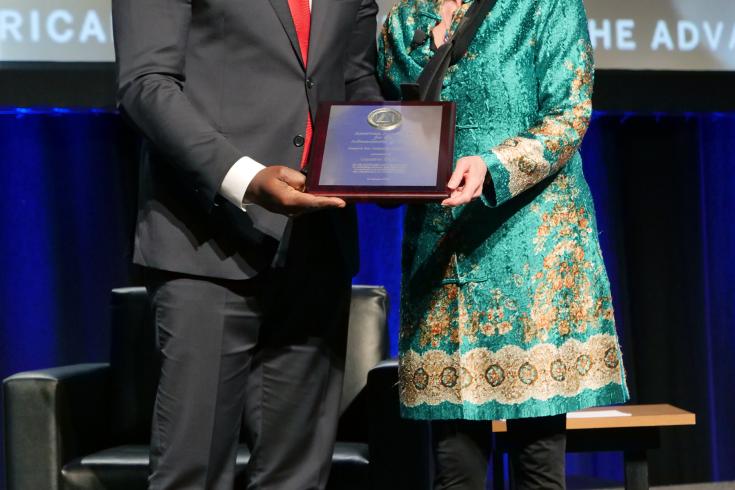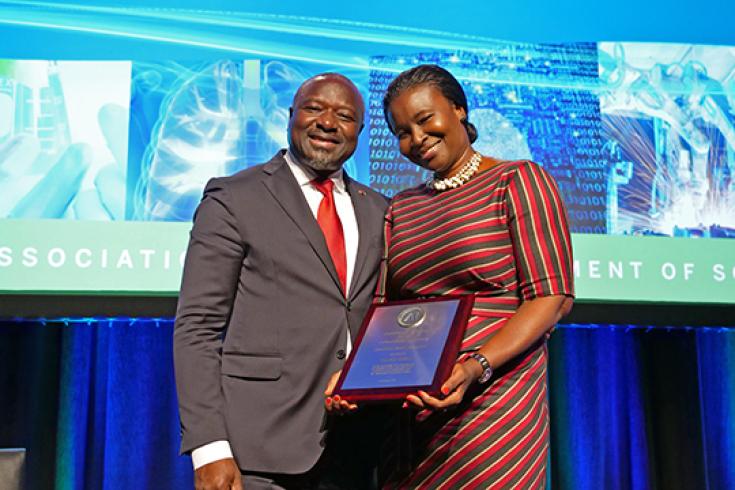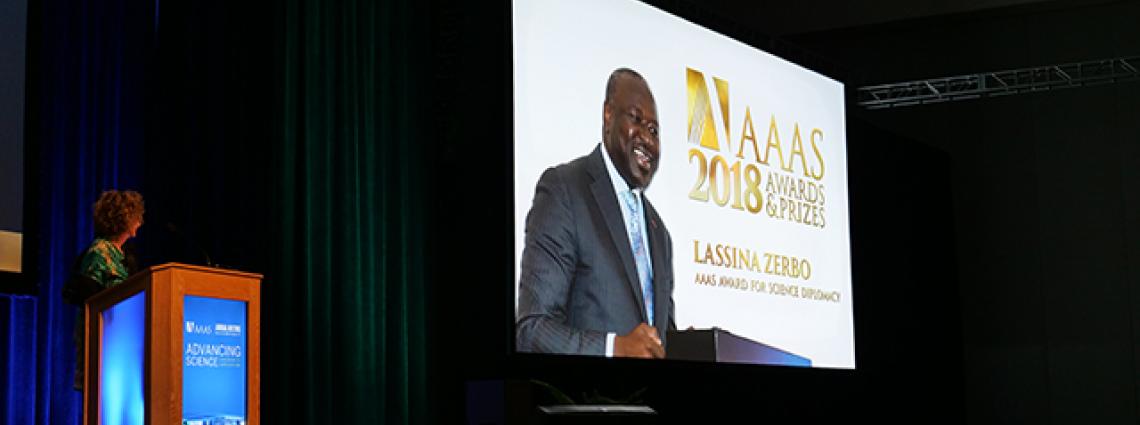Lassina Zerbo wins 2018 AAAS Award for Science Diplomacy
16 February 2018, Austin, Texas
The American Association for the Advancement of Science (AAAS) today presented its 2018 Science Diplomacy award to CTBTO Executive Secretary, Lassina Zerbo, in recognition of his commitment to eliminating nuclear testing, at its annual meeting in Austin, Texas.
Zerbo was chosen for "using his scientific expertise and leadership ability to tackle difficult challenges and promote world peace," the AAAS said in announcing the award.
Zerbo was chosen for "using his scientific expertise and leadership ability to tackle difficult challenges and promote world peace," the AAAS said in announcing the award.

"Dr. Zerbo has repeatedly demonstrated his profound skill at promoting dialogue and interaction among scientists, policymakers, academics and civil society, and encouraging diverse groups to work collaboratively."
The AAAS noted that selecting Zerbo for the award "highlights the continued importance of science diplomacy leadership on the issue of nuclear testing, as well as Zerbo's substantial contributions to these efforts."

"Lassina Zerbo embodies the fundamental values of AAAS, to advance science in the service of humanity."
Reacting to the news, Zerbo said he felt very honoured and humbled to receive such recognition.
"The AAAS's work to advance science to the benefit of all people has long been an inspiration to me. To be recognized with the Science Diplomacy award, by such a revered organization, is a true honour," Zerbo said.
"The AAAS's work to advance science to the benefit of all people has long been an inspiration to me. To be recognized with the Science Diplomacy award, by such a revered organization, is a true honour," Zerbo said.

"Dr. Zerbo is engaging with young people from around the world and inspiring them to not only pursue science as a profession but to use science to contribute to making the world a safer and better place for all its inhabitants."
Zerbo said the value of science diplomacy was too often overlooked. "We must make better use of science diplomacy to ease political tensions and facilitate exchanges. Nowhere is this more vital today than in the Korean peninsula," the Executive Secretary said.

"Zerbo is an outstanding scientist who is using his technical skills to build crucial societal links to help solve one of the most important issues of our times,"
In a message of congratulations, the President of Burkina Faso, Roch Marc Christian Kabore
, wrote that Zerbo "in his efforts to ban nuclear tests, has been able to combine science and diplomacy in a unique way."
Siegfried Hecker, a professor of management science and engineering at Stanford University and director emeritus of the Los Alamos National Laboratory, said in a letter of support for the award nomination that, since Zerbo became the Executive Secretary of the CTBTO, his diplomatic efforts "have gone into overdrive." To date, 166 states have ratified the CTBT, but eight specific states still need to sign and ratify it in order for it to go into effect. "[Zerbo] is constantly on the go," Hecker wrote, "trying to convince the remaining holdouts to ratify the treaty."
William J. Perry, former U.S. Secretary of Defense, the Michael and Barbara Berberian Professor at Stanford University and CTBTO GEM member, wrote in a letter of support for the award nomination "Dr. Zerbo has demonstrated time and again the ability to bring together scientists and leaders from around the world, to encourage them to work collaboratively and to inspire them to increase their resolve to develop and maintain a system that can support the increasing and changing needs of verifying a test ban."
Zerbo expressed his conviction that the prize would help to advance non-proliferation efforts globally. "We need to secure eight ratifications to bring the Comprehensive Nuclear-Test-Ban Treaty (CTBT) into force. On the science front we are ready. We have a verification regime that is second to none, monitoring the globe for any sign of a nuclear test. Now we must capture the political will."
"Dr, Zerbo exemplifies the high degree of dedication and competence necessary to bring together the scientific and diplomatic components of the CTBT."
Zerbo said "the award is a great encouragement not only to me, but for the scientists and team at CTBTO, who work to detect nuclear tests 24/7, and to end them altogether".
"Through international diplomacy built on established scientific achievement in nuclear testing verification, Dr. Zerbo has fought to make this world safer for all the earth's inhabitants."
In its announcement, the AAAS noted Zerbo "has worked to encourage young people to use science to improve the world around them." Members of the CTBTO Youth Group, which Zerbo established in 2016, responded to the news, by sending their congratulations from around the world.
Zerbo was nominated for the 2018 AAAS Award for Science Diplomacy by Pierce Corden, a former AAAS visiting scholar and current adjunct lecturer at American University's School of International Service. In his nomination letter, Corden wrote that Zerbo responded to the 2004 tsunami in Indonesia by making diplomatic arrangements to ensure that seismic data could be provided swiftly to tsunami warning networks. These efforts were taken with the goal of improving early warnings of possible tsunamis.
The AAAS Award recognizes an individual or group working together in the scientific and engineering, or in the foreign affairs communities, making an outstanding contribution to furthering science diplomacy.
The Award consists of a plaque and an honorarium of US$5,000. Zerbo intends to use this as seed funding to initiate a science and diplomacy institute in his home country of Burkina Faso for the region.
14 Feb 2018
